Overview
This article centers on the significant advantages of utilizing 200µL pipette tips within laboratory environments. These tips are essential for ensuring precision, reliability, and sterility—elements that are vital for upholding experimental integrity and enhancing efficiency across a range of scientific applications.
By employing these high-quality instruments, laboratories can achieve superior results, thereby reinforcing the importance of investing in reliable laboratory tools.
In conclusion, the adoption of 200µL pipette tips is not merely a choice but a necessity for any laboratory aiming to excel in its scientific endeavors.
Introduction
The precision and reliability of laboratory tools can significantly influence experimental outcomes, particularly in liquid handling. Among these vital instruments, 200µL pipette tips are distinguished by their versatility and high performance across a range of scientific disciplines. As laboratories pursue greater accuracy and efficiency, it is essential to comprehend the numerous advantages these pipette tips offer.
What obstacles do researchers encounter in achieving optimal liquid handling, and how can selecting the appropriate pipette tips mitigate these challenges?
JM Science 200µL Pipette Tips: Precision and Quality for Your Lab
JM Science's 200ul pipette tips exemplify precision and reliability in liquid handling. Crafted from high-quality polypropylene, these accessories guarantee a secure fit across various pipette brands, minimizing the risk of sample loss and contamination—a critical factor in maintaining the integrity of experimental results.
The precision engineering of these instruments ensures consistent volume delivery with 200ul pipette tips, which is essential for experiments that demand high accuracy. Rigorous testing against stringent quality standards further establishes these accessories as a reliable option for laboratories across various scientific fields.
Laboratory supervisors have observed that the dependability of these tools greatly improves workflow efficiency. One supervisor noted, 'Utilizing high-quality dispensing tools has revolutionized our liquid handling procedures, guaranteeing precision in every experiment.'
As advancements in liquid handling technology continue to evolve in 2025, JM Science remains at the forefront, providing solutions that enhance liquid handling precision and performance.
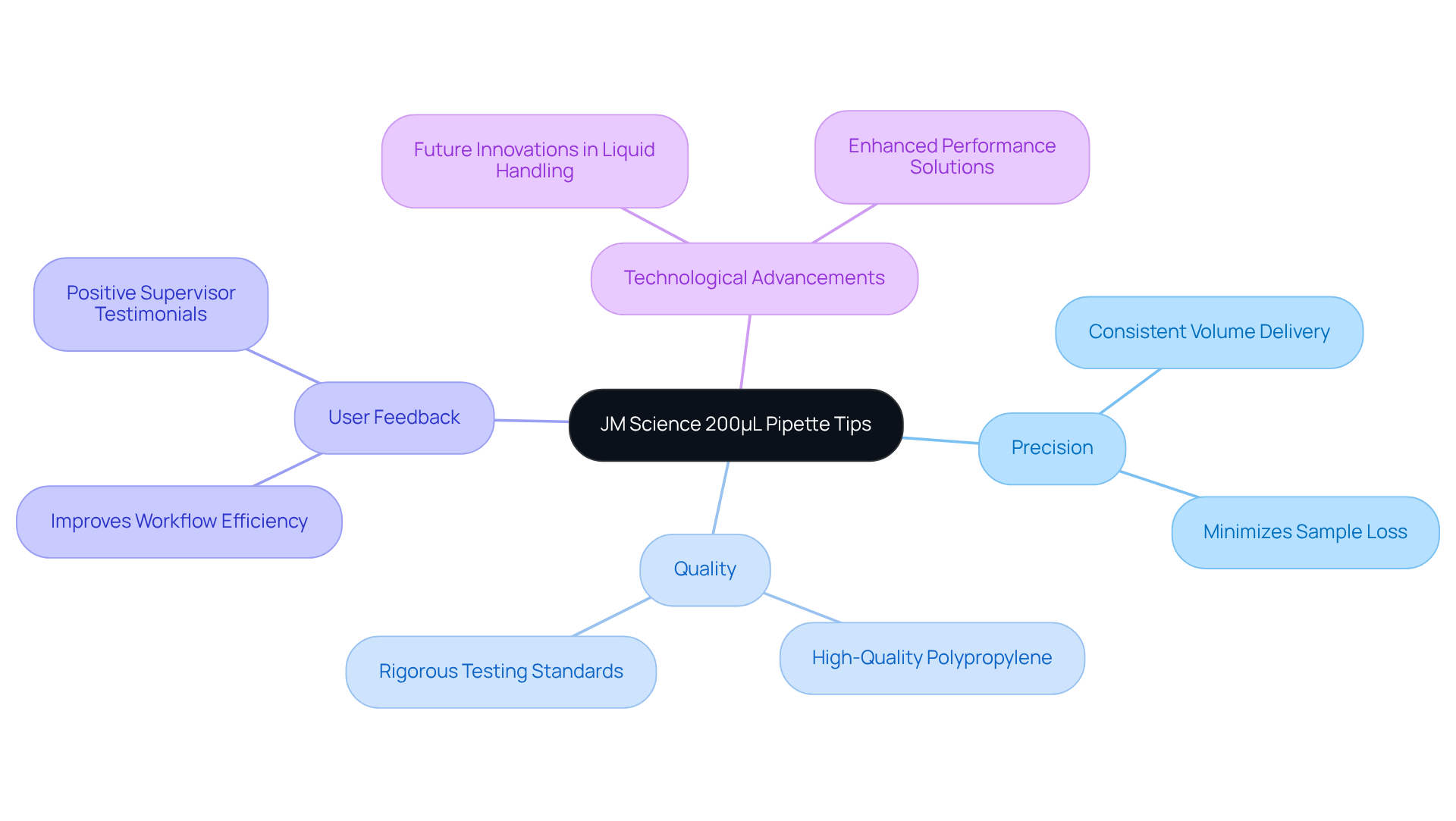
Cole-Parmer Bulk Pipette Tips: Compatible with Major Brands for Versatile Use
Cole-Parmer bulk dispensing accessories are meticulously designed to ensure compatibility with a range of brands, including Eppendorf, Gilson, and Thermo Fisher. This adaptability allows facilities to streamline their operations by utilizing a single type of tip across multiple dispensers, significantly simplifying inventory management. The bulk packaging not only offers a cost-effective solution for high-volume laboratories but also enables researchers to sustain their workflow without the persistent worry of running low on essential supplies.
Facilities that have adopted bulk dispensing tools consistently report substantial cost savings, as purchasing in larger quantities often leads to reduced per-unit costs. A laboratory supervisor noted, "Switching to bulk dispensing tools has not only reduced our expenses but also streamlined our supply chain, allowing us to focus more on our research instead of logistics."
Recent trends indicate a growing preference for bulk dispensing tools among leading brands, driven by the increasing demand for efficiency and cost-effectiveness within research environments. The laboratory dispenser market is projected to reach $3.44 billion by 2029, expanding at a CAGR of 8.7%. This growth is primarily fueled by the burgeoning biotech and pharmaceutical sectors, which are driving the need for precise and reliable liquid handling tools. Consequently, the transition towards bulk purchasing is becoming standard practice in high-volume laboratories aiming to enhance their operational efficiency.
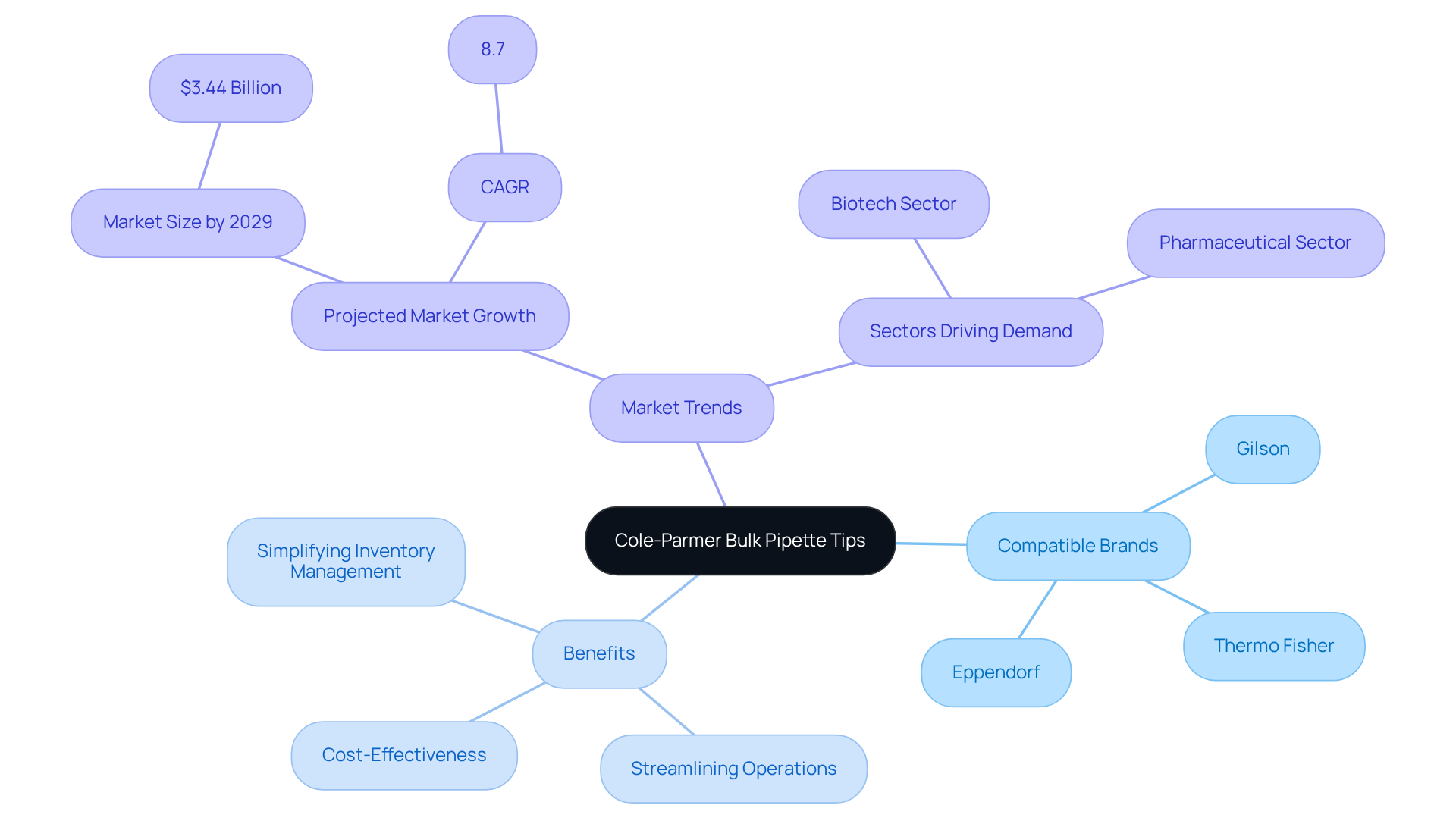
Importance of Sterility in 200µL Pipette Tips: Ensuring Compliance and Accuracy
The sterility of 200ul pipette tips is crucial in pharmaceuticals and medical diagnostics, as even minor impurities can lead to significant inaccuracies in experimental results. Contaminated instruments introduce unwanted variables, skewing data and potentially resulting in regulatory non-compliance. Recent studies indicate that non-sterile sampling tools frequently contribute to impurities, underscoring the urgent need for stringent sterilization methods.
JM Science's sterile laboratory tools are produced in regulated cleanroom environments and undergo rigorous testing procedures, including biological indicator evaluation and parametric supervision, to ensure compliance with the highest sterility standards. This steadfast commitment to sterility not only enhances experimental accuracy but also guarantees adherence to industry regulations, thereby safeguarding the integrity of research and development processes within the pharmaceutical sector.
To mitigate contamination risks, laboratories must:
- Provide ongoing training on proper liquid handling techniques
- Ensure that all dispensing attachments are sourced from reputable suppliers
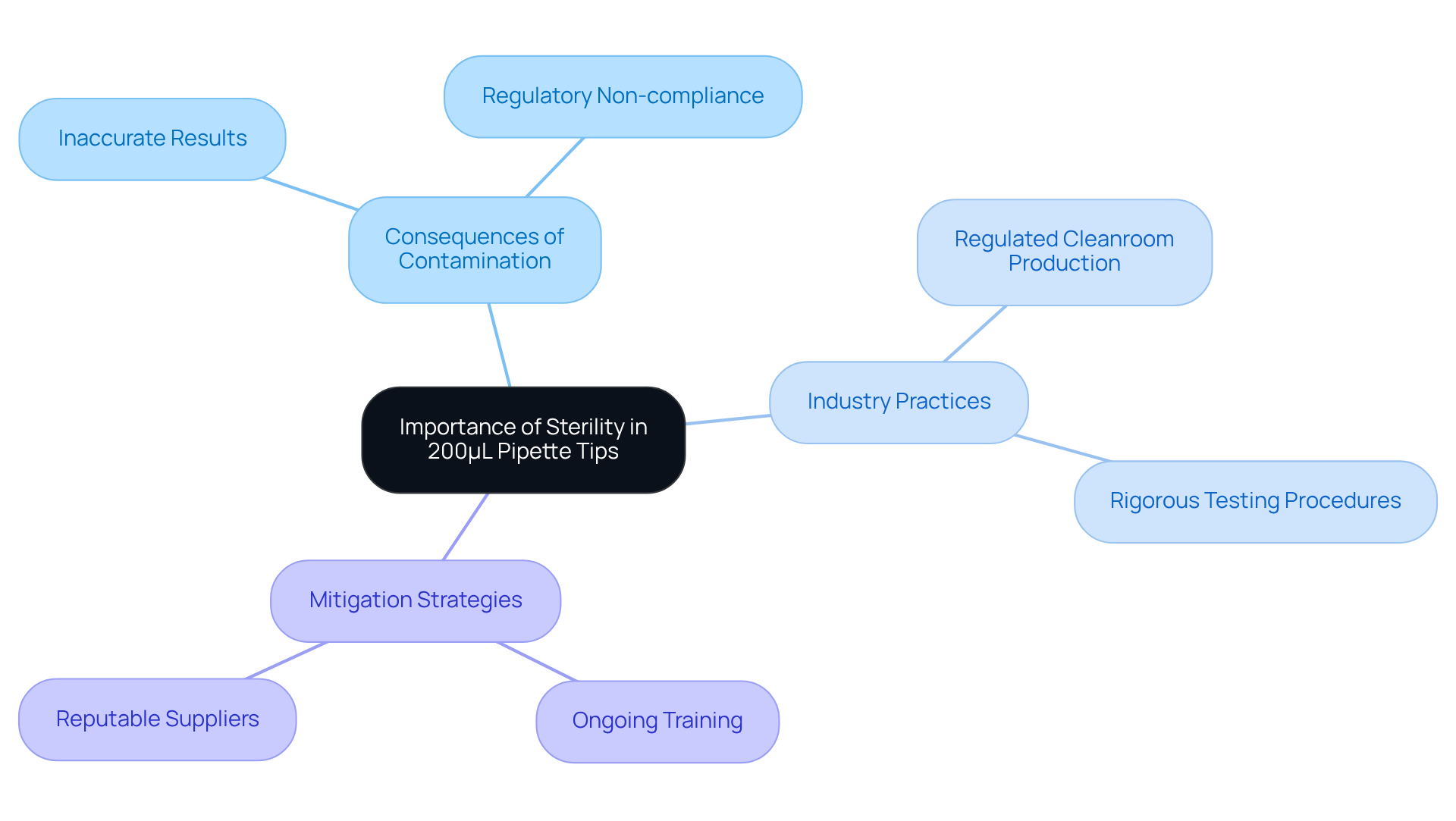
Applications of 200µL Pipette Tips: Versatility in Scientific Research
200ul pipette tips are essential tools in various scientific disciplines, including molecular biology, biochemistry, and clinical diagnostics. Their versatility is evident in applications such as:
- PCR setup
- Reagent preparation
- Sample dilution
- The utilization of 200ul pipette tips
By accommodating a wide range of liquids—from viscous solutions to sensitive reagents—these devices significantly enhance their utility in research environments. Laboratories can rely on these devices for consistent performance across diverse applications, ensuring reliable results that are essential for scientific integrity.
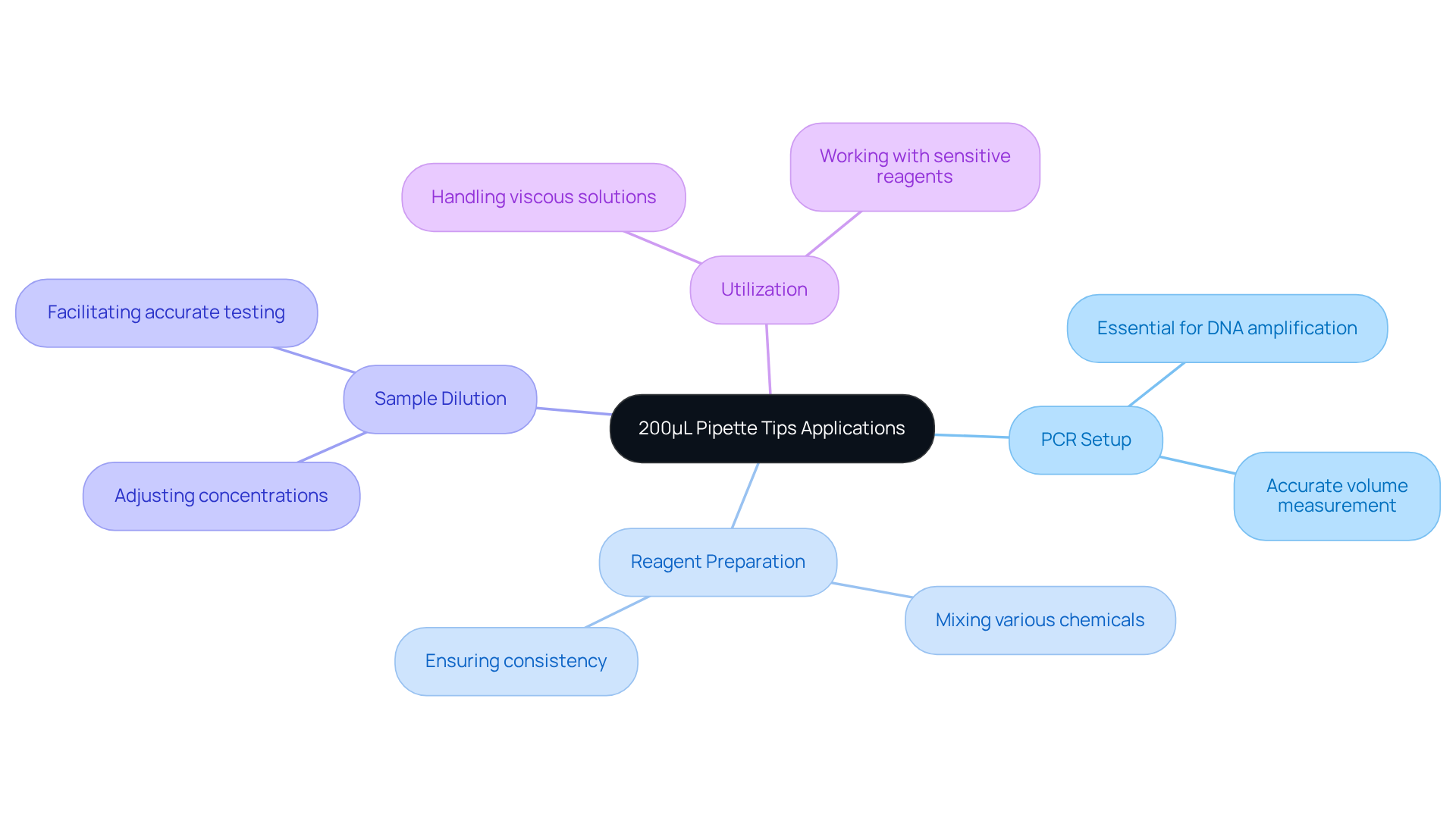
Filter Tips for 200µL Pipette Tips: Enhancing Sample Integrity
The integrity of samples is safeguarded by filter ends designed for 200ul pipette tips, which prevent pollution from aerosols and liquid transfer. These recommendations feature a built-in filter made from polypropylene or polyethylene, serving as a barrier that protects both the pipette and the sample from potential contaminants. This characteristic is particularly crucial in sensitive assays or when handling hazardous substances, where even minor impurities can jeopardize results.
The use of filter ends significantly enhances the reliability of test outcomes and diminishes the risk of cross-contamination. Research indicates that facilities employing standard pipette attachments experience a 20% carryover pollution rate, while those utilizing filtered attachments observe a reduction to 14%. However, it is essential to recognize that filtered options are approximately 35% more expensive than their unfiltered counterparts, a significant factor for laboratories in their purchasing decisions.
Moreover, while filtered options reduce cross-contamination, they do not eliminate it entirely, underscoring the need for continuous vigilance in impurity control. The adoption of filtered ends, particularly the use of 200ul pipette tips, has gained traction in the context of COVID-19 testing, where stringent contamination control is paramount. Many professionals in the laboratory endorse the use of filter devices, citing their effectiveness in ensuring precise and consistent results while fostering a healthy working environment. Additionally, the customized design of filter tips allows for easy insertion into devices, saving time and effort for staff.
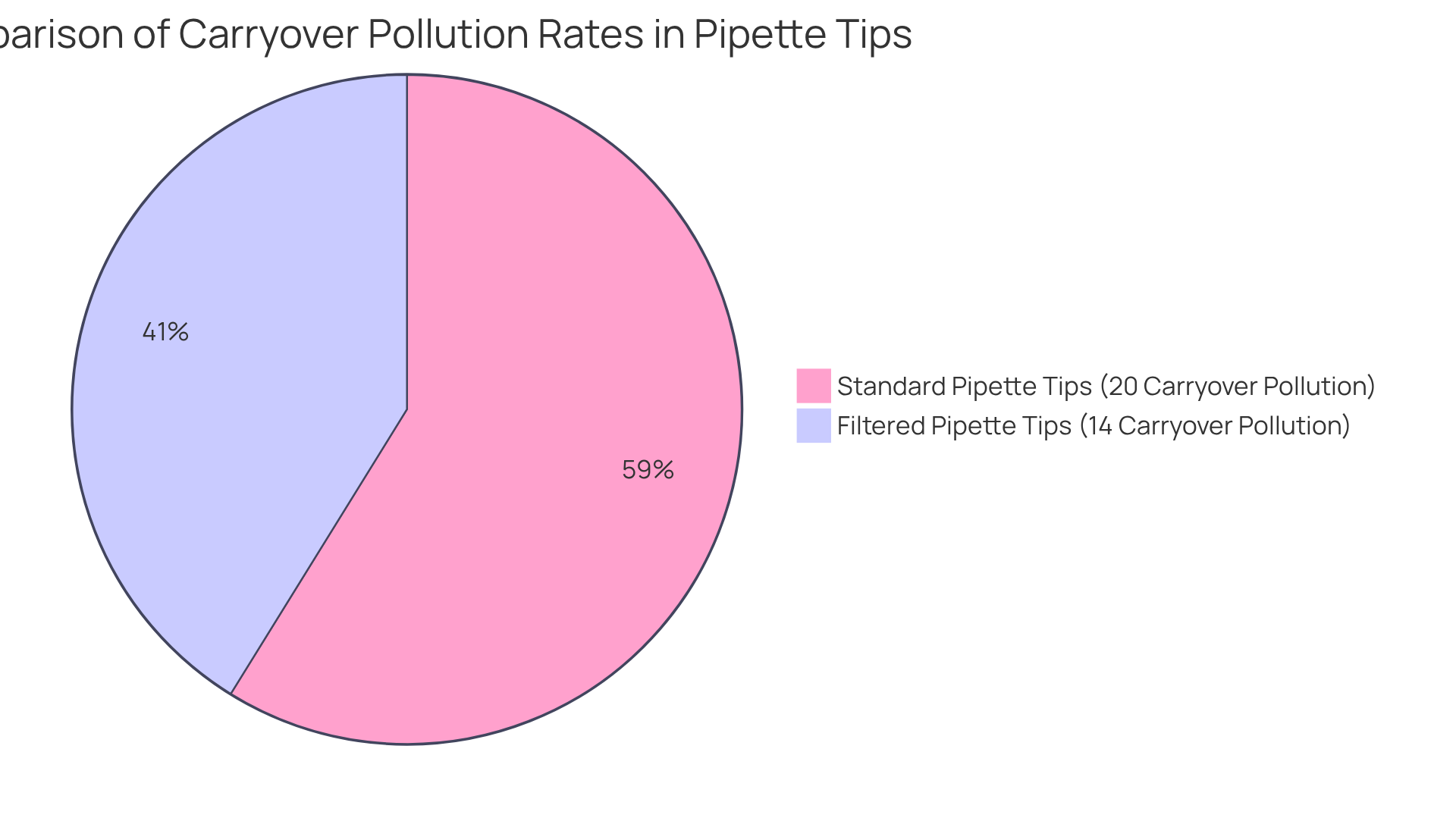
Cost-Effectiveness of Bulk Pipette Tips: Budget-Friendly Solutions for Labs
Acquiring 200ul pipette tips in bulk presents substantial cost savings for research facilities, particularly those engaged in high-volume liquid handling. By selecting bulk packaging, laboratories can significantly lower the per-tip expense of 200ul pipette tips, ensuring a steady supply without the inconvenience of frequent reordering. This strategy not only conserves financial resources but also minimizes downtime associated with supply shortages, such as the absence of 200ul pipette tips, which can disrupt workflows and lead to inefficiencies.
In fact, laboratories that have embraced bulk purchasing of 200ul pipette tips report enhancements in operational efficiency, allowing them to allocate resources more effectively and focus on critical tasks instead of supply management. Lab managers have noted that investing in bulk dispensing tools like 200ul pipette tips not only aligns with budgetary constraints but also boosts workflow efficiency, ultimately resulting in improved research outcomes.
Furthermore, with the global market for disposable transfer devices projected to reach $2.3 billion by 2031, driven by the rising incidence of cancer and AIDS, the trend toward bulk purchasing is increasingly prevalent. Regular calibration of liquid handling devices is also essential to maintain precision and compliance, underscoring the need for reliable materials such as disposable tips in laboratory settings.
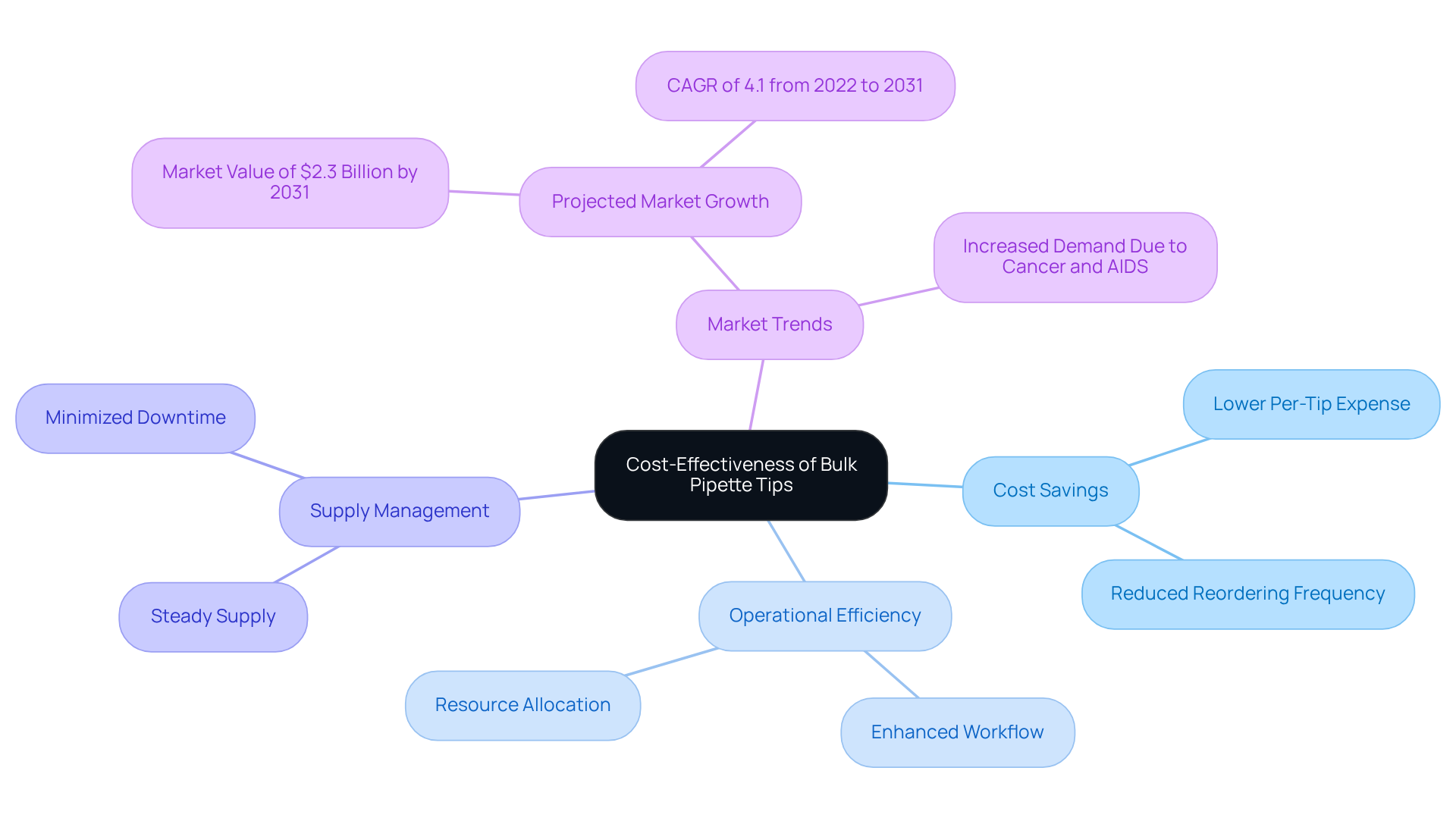
Proper Storage and Handling of 200µL Pipette Tips: Best Practices for Longevity
To maximize the lifespan and performance of 200ul pipette tips, meticulous storage and handling practices are crucial. Tips should be kept in a cool, dry environment, shielded from direct sunlight and extreme temperatures, which can compromise their integrity.
Careful management of these tools is essential to prevent bending or crushing, as such damage can lead to inaccuracies in pipetting. Employing racks or trays specifically designed for 200ul pipette tips and other liquid handling devices helps maintain organization and minimizes the risk of contamination.
Furthermore, using high-quality, compatible 200ul pipette tips from the same manufacturer is vital for ensuring optimal performance. A lab manager noted that implementing these practices significantly reduced the incidence of tip-related errors, enhancing overall workflow efficiency.
Regular cleaning of laboratory instruments with a lint-free cloth and 70 percent ethanol is also recommended to preserve their integrity. By adhering to these best practices, facilities can guarantee the reliability and durability of their dispensing tools, ultimately contributing to more accurate and consistent outcomes in their experiments.
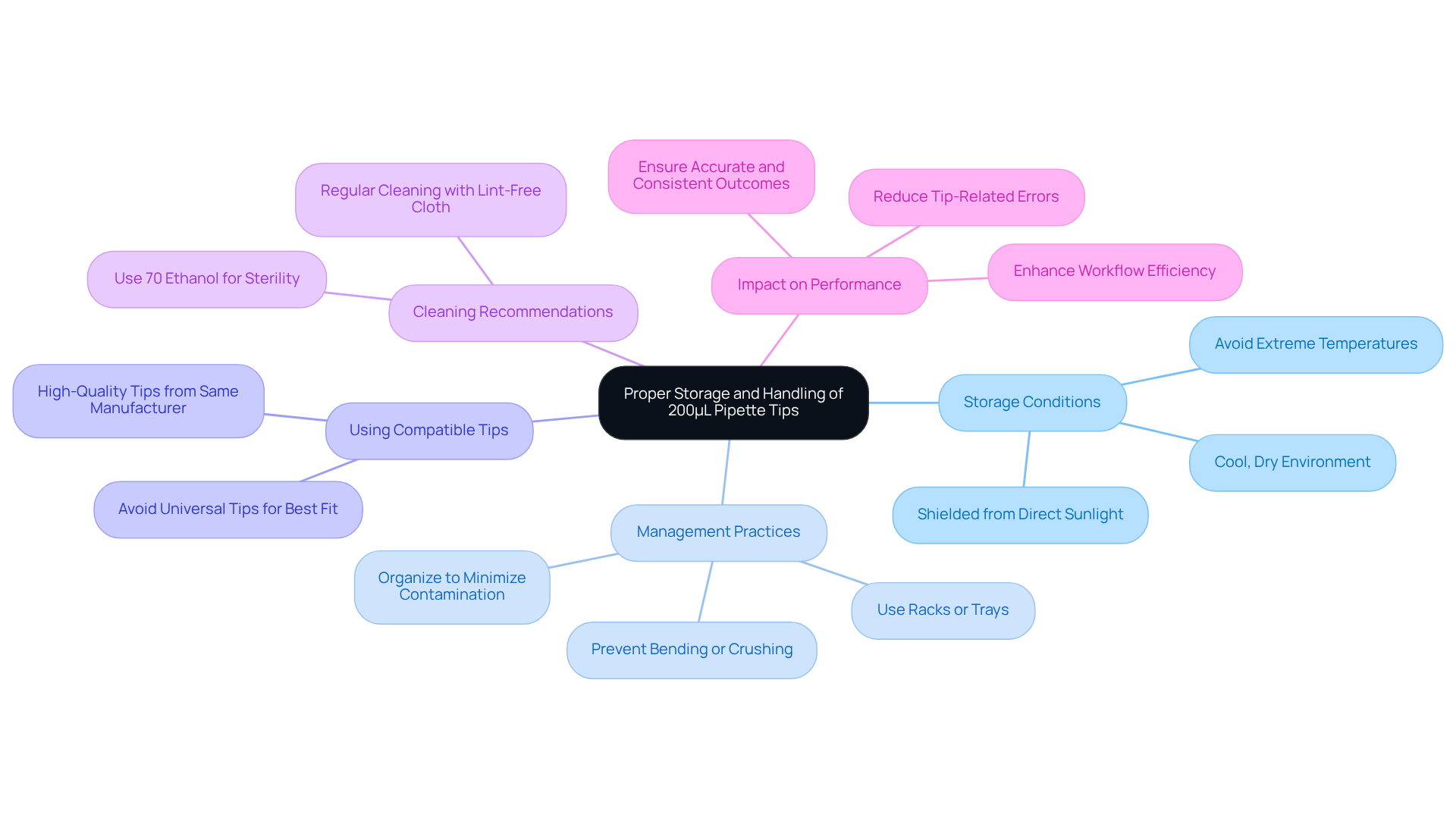
Environmental Impact of Pipette Tips: Sustainability in Laboratory Practices
The ecological effect of disposable instruments has emerged as a significant concern within laboratory environments, particularly due to the extensive production of single-use plastics. Laboratories must prioritize sustainable practices, such as the use of biodegradable or recyclable 200ul pipette tips, to mitigate this impact. Furthermore, establishing recycling programs for used tips and their packaging can lead to a substantial reduction in waste. By embracing sustainability, laboratories not only contribute to environmental conservation but also enhance their operational efficiency, reinforcing their commitment to responsible science.
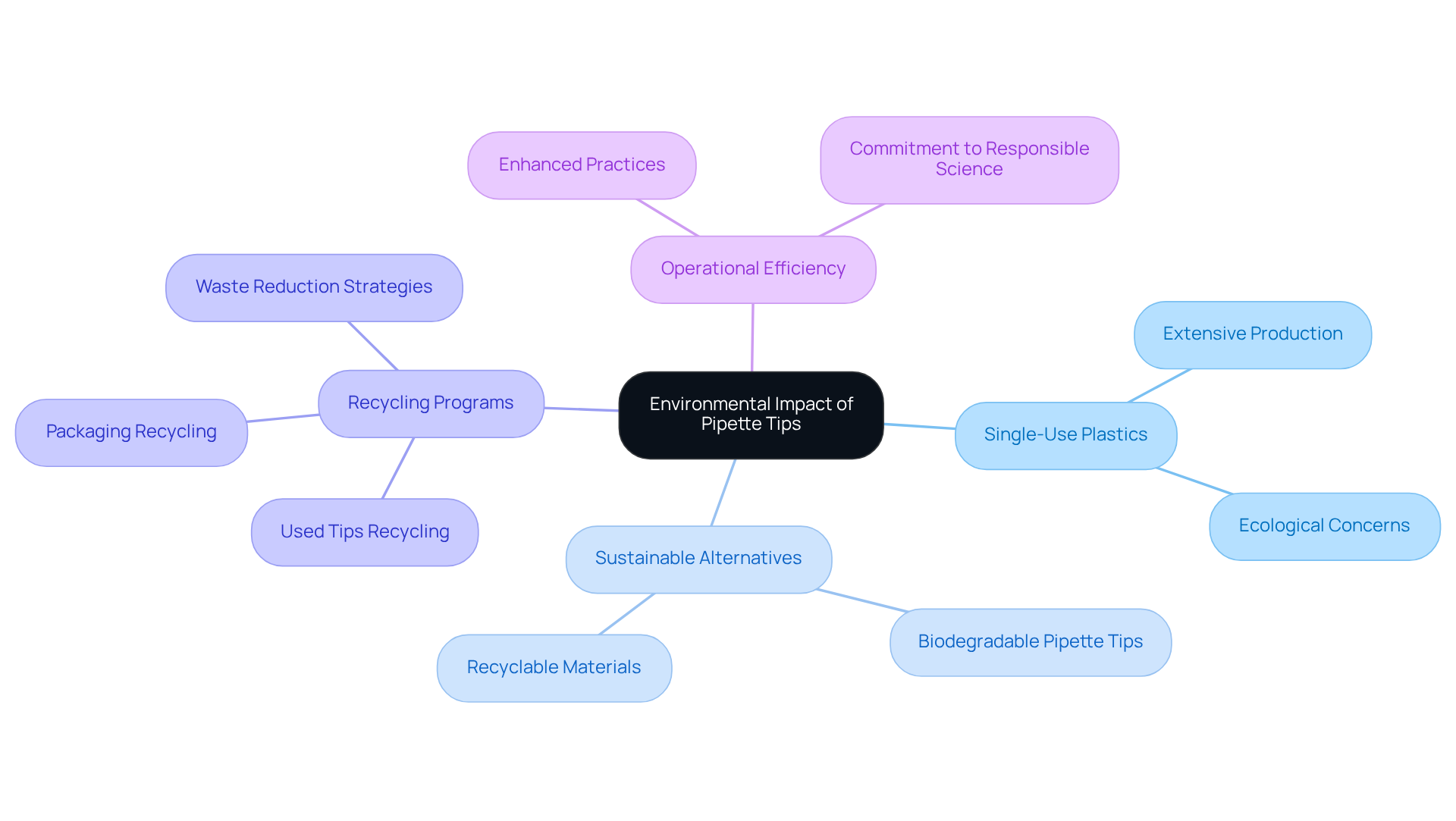
Advancements in Pipette Tip Technology: Innovations for Enhanced Performance
Recent advancements in tip technology have introduced features such as low-retention surfaces, which significantly minimize sample loss, and integrated filters that enhance sample integrity. According to Raksha Sharma, the global market size for low retention laboratory dispensing tools was valued at approximately USD 950 million in 2023, underscoring the growing significance of these innovations.
These advancements not only enhance the precision of liquid handling but also reduce the risk of contamination, a critical factor in high-accuracy scientific settings. For instance, facilities utilizing 200ul pipette tips have reported a notable decrease in sample loss, leading to more dependable experimental results. This is particularly crucial in high-throughput screening and molecular biology applications, where even minute errors can result in substantial deviations in outcomes.
By staying informed about these technological advancements, research facilities can optimize their workflows and achieve superior results in their research endeavors.
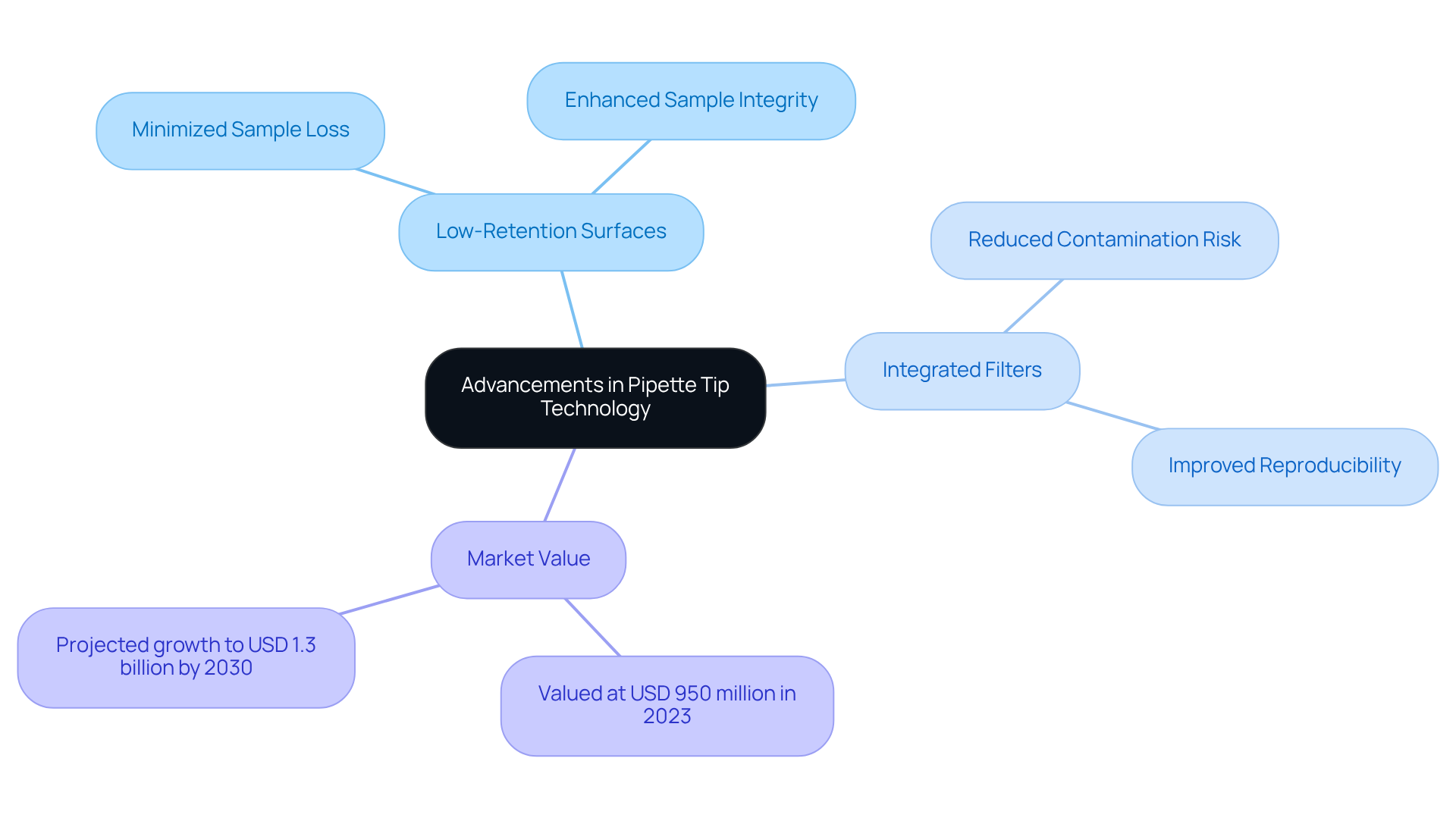
Regulatory Standards for 200µL Pipette Tips: Ensuring Compliance in Pharmaceutical Labs
In pharmaceutical facilities, adherence to regulatory standards is paramount for maintaining the integrity of research and ensuring the safety of products. Specifically, 200ul pipette tips must comply with the rigorous standards established by regulatory authorities such as the FDA and EMA. JM Science's pipette accessories are meticulously produced to meet these standards, providing research facilities with the assurance necessary to perform their tasks effectively.
Furthermore, the utilization of advanced titration techniques, exemplified by the Hiranuma Aquacounter AQV-300 Volumetric and AQ-300 Coulometric Karl Fischer Titrators, underscores the critical importance of employing compliant tools. By integrating 200ul pipette tips with sophisticated titration methods, laboratories not only safeguard their research but also play a vital role in contributing to public health and safety.
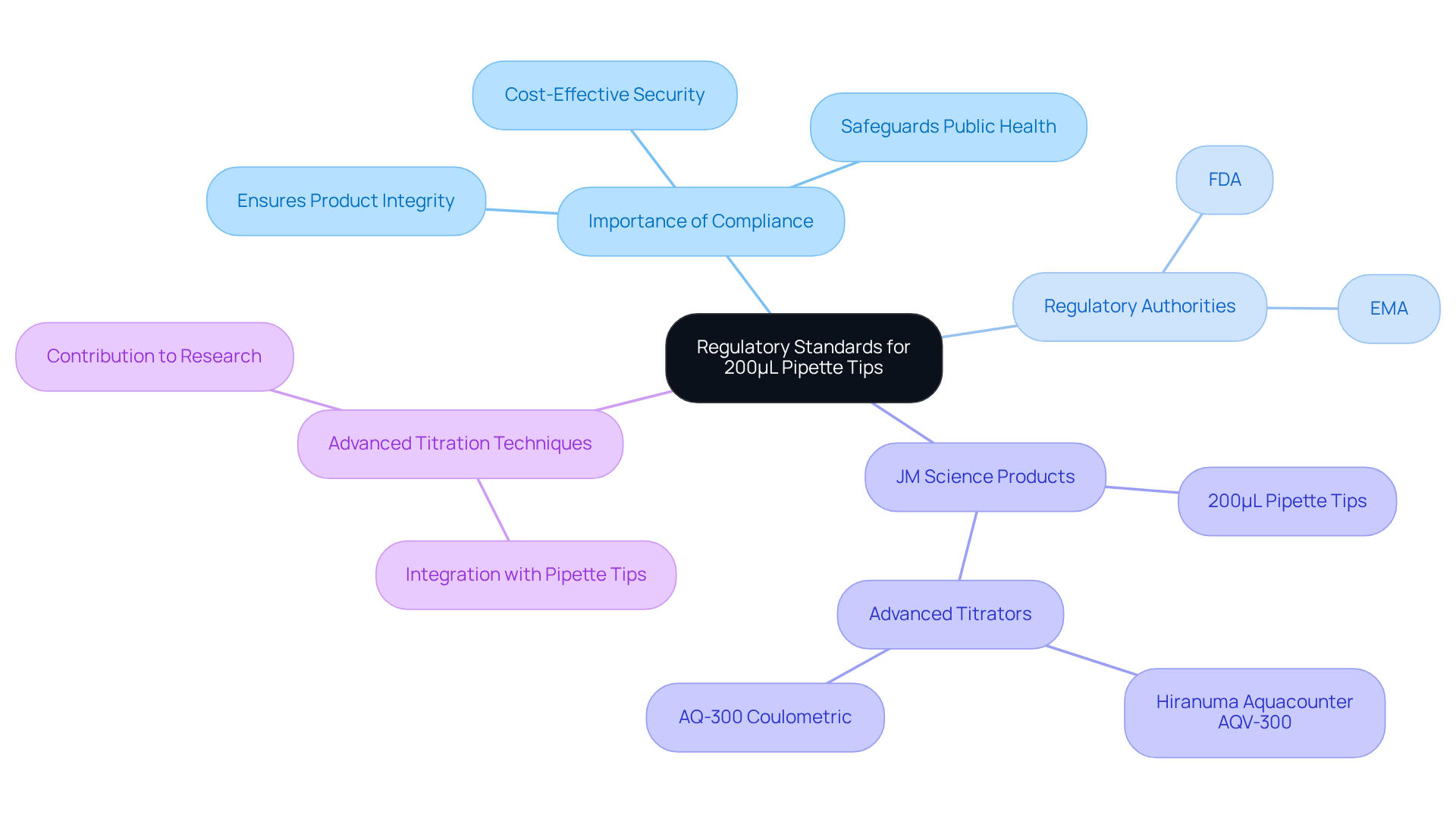
Conclusion
The advantages of 200µL pipette tips in laboratory settings are indisputable, delivering precision, efficiency, and versatility that are essential for scientific research. These tips, whether sourced from JM Science or Cole-Parmer, guarantee accurate liquid handling, protect sample integrity, and adhere to stringent regulatory standards. By employing high-quality materials and innovative designs, laboratories can markedly enhance their operational workflows and research outcomes.
Key insights throughout this discussion underscore the critical importance of:
- Sterility
- Compatibility with various pipette brands
- Cost-effectiveness associated with bulk purchasing
Furthermore, the conversation highlights the vital role of proper storage and handling practices in extending the lifespan of these essential tools. Notably, advancements in pipette tip technology, including low-retention surfaces and integrated filters, are revolutionizing liquid handling, empowering researchers to achieve more reliable results.
As laboratories pursue excellence in their research endeavors, the adoption of these practices and innovations becomes not just beneficial but imperative. By embracing high-quality pipette tips, facilities not only enhance experimental accuracy but also contribute to sustainable laboratory practices. Prioritizing the use of reliable tools ensures compliance, minimizes waste, and ultimately propels the progress of scientific discovery.




